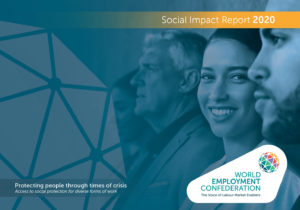Published on 6th July 2020
 In the wake of the Covid-19 crisis, the shortcomings of current social protection systems in many countries have become blatant The Social Impact Report 2020 by the World Employment Confederation, shows that an employment contract remains the key to formal social protection coverage and that self-employed workers are significantly more vulnerable than workers with an employment contract.
In the wake of the Covid-19 crisis, the shortcomings of current social protection systems in many countries have become blatant The Social Impact Report 2020 by the World Employment Confederation, shows that an employment contract remains the key to formal social protection coverage and that self-employed workers are significantly more vulnerable than workers with an employment contract.
In 90% of the countries analysed, agency workers and workers in other forms of contractual employment enjoy full statutory access to unemployment and sickness benefits. Partial access to those benefits is available in the remaining countries.
The report further establishes that one challenging feature of current social protection systems is the discrepancy between statutory and effective access to social protection benefits for employed workers. Eligibility criteria, such as thresholds in terms of working days to be reached, can prevent some groups to access benefits in case of unemployment and sickness.
Protecting people through times of crisis goes beyond the provision of basic safety nets. Implementing lifelong learning mechanisms to facilitate speedy transitions between jobs and sectors, raising labour market participation, reducing unemployment, and fighting informal employment are key in delivering security to workers and people in general. The World Employment Confederation’s Social Impact Report 2020 also looks into how the private employment services industry contributes in those areas.